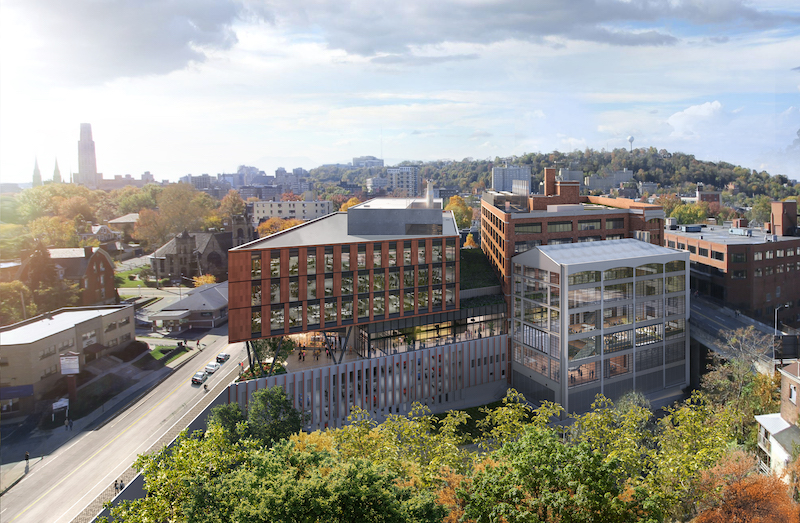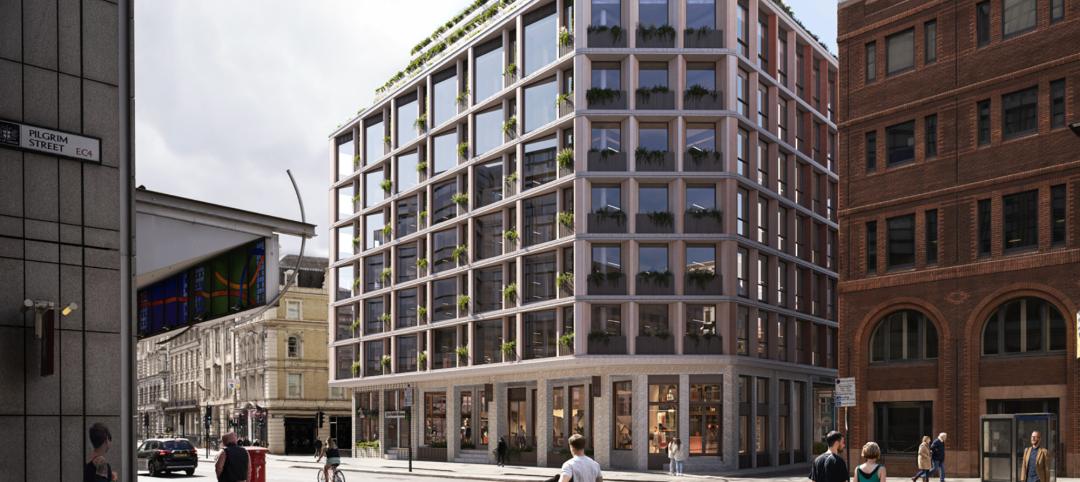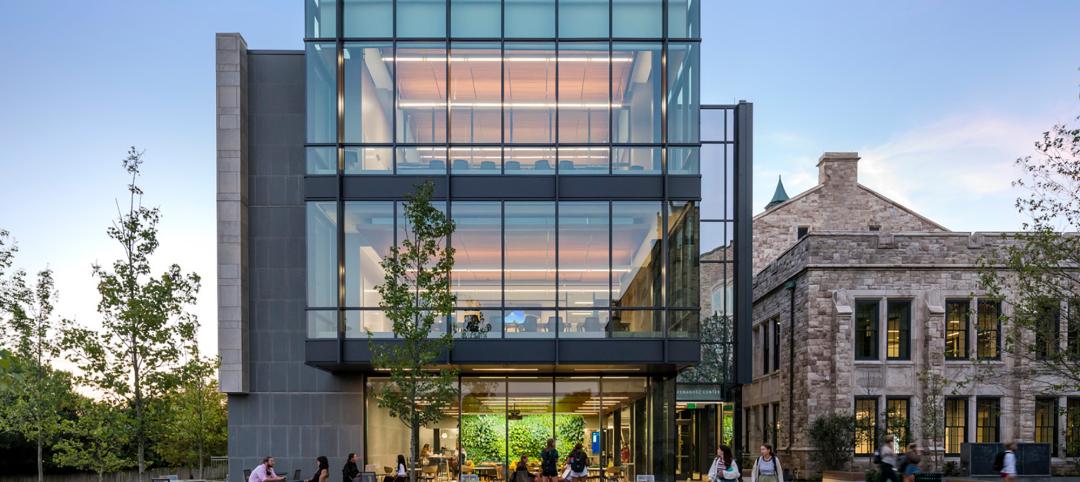A former Ford Motor Company assembly plant in Pittsburgh, which was built in 1915 as a factory and showroom for Model Ts, is being transformed into a research, innovation, and entrepreneurship hub called The Assembly.
A team led by Wexford Science & Technology and the University of Pittsburgh is adding 105,000 sf to the plant’s original 250,000 sf. The enlarged building will house labs and office spaces, an in-building parking garage with a secured bike room and showers; gathering, event, and conference spaces; a 250-seat auditorium, and a restaurant and café.
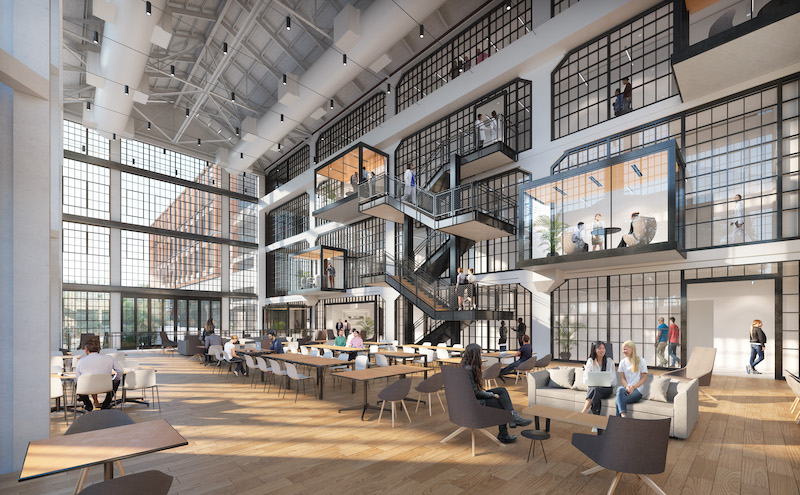
The Assembly will provide ample space for gatherings and events. The stairwell access to each floor is one of Wexford's design signatures.
The Assembly, which is scheduled to open early next year, will be the future home to the university’s researchers who are focused on discoveries related to cancer biology and other areas. The final beam for this project was secured on May 25, an event that was applauded by over 300 construction workers on site.
Also see: Pittsburgh’s Neighborhood 91 for additive manufacturing
ANOTHER INNOVATION CORNERSTONE
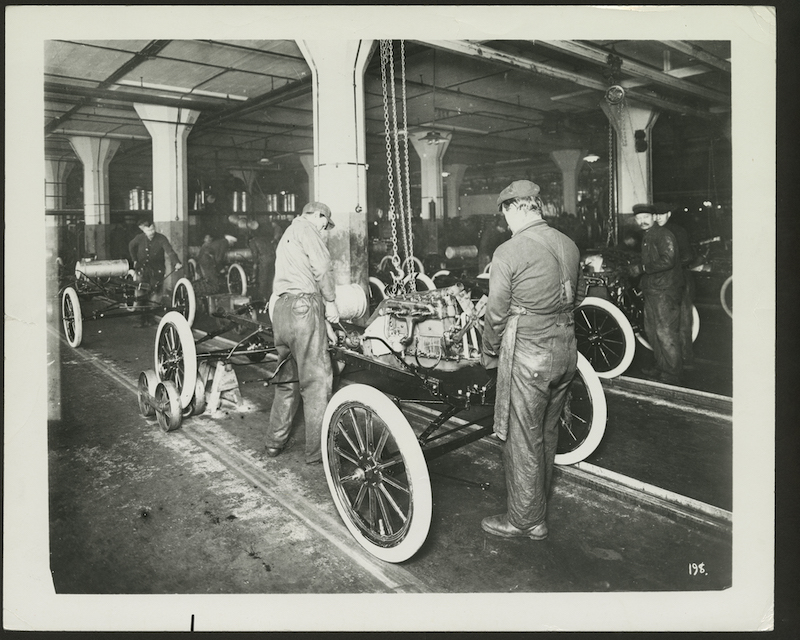
Ford Motor Company made Model Ts in this plant for more that 30 years.
Wexford’s website states that this adaptive reuse and renovation will create a 345,000-sf, three-story facility with 36,000-sf floor plates with 14-ft 6-inch floor-to-floor heights, and 108,000 sf of rentable space. The Assembly is located in Pittsburgh’s Baum-Centre corridor, a mass-transit oriented urban district designed to serve businesses.
Also see: Pittsburgh combats construction fraud
“These state-of-the-art labs, dramatic convening spaces, and top-tier researchers will attract the talent, ideas, and companies that will continue to propel life science innovation in Pittsburgh,” says John Grady, Wexford’s Northeast Region Executive and Senior VP of Development.
ZGF Architects designed the renovation. Turner Construction, Ventas Inc., and Bank of America are Wexford’s other partners on this project, which rivals in scale the Mill 19 redevelopment at Hazelwood Green.
“The Assembly is a cornerstone of the Pittsburgh Innovation District,” says Sean Luther, Executive Director of InnovatePGH, a public-private partnership that supports innovation growth in Pittsburgh. “Fully leveraging Pittsburgh’s life science assets requires exactly the intentionally designed, multi-tenant facilities developed by Wexford. The Assembly represents the full vision and potential of the Pittsburgh Innovation District to translate academic research into economic development that benefits all of Western Pennsylvania.”
This $330 million redevelopment project broke ground in the summer of 2019. The year before, the building was added to the National Register of Historic Places. Ford made and sold cars out of this eight-story plant for more than 30 years.
Related Stories
Adaptive Reuse | Jul 27, 2023
Number of U.S. adaptive reuse projects jumps to 122,000 from 77,000
The number of adaptive reuse projects in the pipeline grew to a record 122,000 in 2023 from 77,000 registered last year, according to RentCafe’s annual Adaptive Reuse Report. Of the 122,000 apartments currently undergoing conversion, 45,000 are the result of office repurposing, representing 37% of the total, followed by hotels (23% of future projects).
Urban Planning | Jul 26, 2023
America’s first 100% electric city shows the potential of government-industry alignment
Ithaca has turned heads with the start of its latest venture: Fully decarbonize and electrify the city by 2030.
Multifamily Housing | Jul 25, 2023
San Francisco seeks proposals for adaptive reuse of underutilized downtown office buildings
The City of San Francisco released a Request For Interest to identify office building conversions that city officials could help expedite with zoning changes, regulatory measures, and financial incentives.
Sustainability | Jul 13, 2023
Deep green retrofits: Updating old buildings to new sustainability standards
HOK’s David Weatherhead and Atenor’s Eoin Conroy discuss the challenges and opportunities of refurbishing old buildings to meet modern-day sustainability standards.
Multifamily Housing | Jul 11, 2023
Converting downtown office into multifamily residential: Let’s stop and think about this
Is the office-to-residential conversion really what’s best for our downtowns from a cultural, urban, economic perspective? Or is this silver bullet really a poison pill?
Adaptive Reuse | Jul 10, 2023
California updates building code for adaptive reuse of office, retail structures for housing
The California Building Standards Commission recently voted to make it easier to convert commercial properties to residential use. The commission adopted provisions of the International Existing Building Code (IEBC) that allow developers more flexibility for adaptive reuse of retail and office structures.
Adaptive Reuse | Jul 6, 2023
The responsibility of adapting historic university buildings
Shepley Bulfinch's David Whitehill, AIA, believes the adaptive reuse of historic university buildings is not a matter of sentimentality but of practicality, progress, and preservation.
Multifamily Housing | Jun 19, 2023
Adaptive reuse: 5 benefits of office-to-residential conversions
FitzGerald completed renovations on Millennium on LaSalle, a 14-story building in the heart of Chicago’s Loop. Originally built in 1902, the former office building now comprises 211 apartment units and marks LaSalle Street’s first complete office-to-residential conversion.
Multifamily Housing | May 23, 2023
One out of three office buildings in largest U.S. cities are suitable for residential conversion
Roughly one in three office buildings in the largest U.S. cities are well suited to be converted to multifamily residential properties, according to a study by global real estate firm Avison Young. Some 6,206 buildings across 10 U.S. cities present viable opportunities for conversion to residential use.
Multifamily Housing | May 16, 2023
Legislators aim to make office-to-housing conversions easier
Lawmakers around the country are looking for ways to spur conversions of office space to residential use.cSuch projects come with challenges such as inadequate plumbing, not enough exterior-facing windows, and footprints that don’t easily lend themselves to residential use. These conditions raise the cost for developers.


